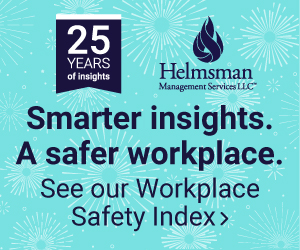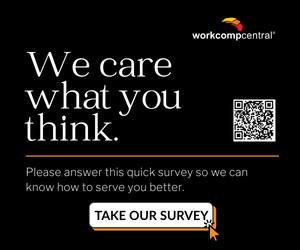Industry Insights
October 13, 2017
Luna: A Case for National Standards in State Workers' Compensation
- National
- - Popular with: Employer
- - 0 shares
Would you be surprised to know that the definition of “employee” and “contractor” varies from one state to another? Would you be shocked if I told you that more state workers’ compensation agencies operate without a full-time or part-time medical director on staff than those that do?

Carlos Luna
Speaking with a prominent regulator and workers’ compensation expert at the #IAIABC103 conference in Portland, Oregon, two weeks ago rekindled my interest in determining what establishing national standards could do for a system where variances from one jurisdiction to the next seem endless.
The sources of variability in definitions and standards are numerous. Among the most prevalent are resources (expertise, budget, time, etc.). Is it reasonable to suggest that the varying availability of resources from state to state present limitations for regulators in their pursuit of appropriately researching prospective public policy that will improve system outcomes?
Take evidence-based medicine, for example.
Admittedly, EBM is a very complex concept that few people truly understand and appreciate (Note: This is particularly true, and ironic, in the workers’ compensation industry where misaligned incentives make it nearly impossible for stakeholders to share a common goal).
EBM goes beyond the review of literature and authoring of content. The path taken to form conclusions, interpreting scientific literature and answering defined clinical questions ultimately constitutes the content as evidence-based. Without an informed guide to point out technical deficiencies and/or important considerations, the outcome for the agency looking to adopt may result in the selection of a consensus-based resource, or worse, a resource with an undetermined basis.
Serving a Thanksgiving meal on a fast-food budget
In workers’ compensation, state officials routinely struggle to serve a Thanksgiving meal given little more than a fast-food budget. This type of limitation in resources hinders small markets from properly researching and vetting EBM tools when considering a source for adoption.
In a best-case scenario, the adopted solution goes through uncontested for quality and trustworthiness due to a lack of understanding, and provides a standard of care where there previously was none, albeit lesser in quality.
Worst-case scenario: The inadequately vetted solution becomes a liability to patient health, and is a source of significant system friction and cost due to errant research findings by the agency adopting it. With proper informed due diligence, which requires resources, both scenarios are entirely avoidable.
Stakeholders in the workers’ compensation system throughout the country are actively expanding the conversation on the necessary attributes in EBM treatment guidelines, and drug formularies, for state adoption. Increased scrutiny is placed on determining if guidelines and formularies are built atop a basis that aligns with public standards defined by the National Academies of Sciences, Engineering, Medicine (formerly the Institute of Medicine).
Interestingly, these standards, and the nonprofit entity that measures compliance (i.e., AHRQ’s National Guideline Clearinghouse), are de-emphasized and lessened in value by small market states that do not have properly experienced personnel evaluating the standards’ merits. This should prompt action by every person with an interest in workers’ compensation — employees, attorneys, employers, physicians, carriers, et al.
Good public policy is never easy, and rarely inexpensive
Select state agencies have expressed concerns with limited options for adopting EBM content and tools due to absent resources such as a medical director, pharmacy and therapeutics committee, and staff with expertise in the area of scientific research. A state’s limitations supersede its needs under these restrictive circumstances. The more limited the resources, the fewer options for these agencies to consider.
It is my sincere belief that small market agencies, much like their large market counterparts, work extremely hard to educate themselves on evidence-based medicine treatment guidelines and drug formularies — as well any other area they seek to reform — and aim to make the right decisions. In the end, they are left to act using the resources they have at their disposal, whether plentiful or scarce.
Perhaps a national standard for the evaluation and adoption — better yet a definition of EBM for workers’ compensation, as an example — would help afford better options for small markets managing with modest resources.
Carlos Luna is director of government affairs for ReedGroup, which publishes the American College of Occupational and Environmental Medicine treatment guidelines and drug formulary.
Advertisements
Columns
- Barthel: How Hard Can Intoxication Defense Be? 01/30/26
- Geaney: What Questions Should Permanency Evaluators Ask Petitioners? 01/28/26
- Paduda: Health Care Is Missing the Point 01/26/26
- Kamin: AI Citations Present Cautionary Tale for Attorneys 01/20/26
- Barthel: Is Rodriguez Worth It? 01/16/26
- Tolentino: Keep Your Friends Close, but Your Enemies Closer 01/14/26
- Young: The Top 2025 California Workers' Comp Developments 01/09/26
- Langham: Not Always an Accident 01/07/26
- Barthel: Is SIBTF a Great Idea Gone Awry? 01/05/26
- CAAA: New Comp Laws Take Effect in 2026 12/31/25
- Opalisky: The Ongoing War Over State's Statutory Employer Doctrine 12/30/25
- Kamin: Our Top 10 Blogs of 2025 12/26/25
- Barthel: Are You an Employer, or Do You Use Independent Contractors? Can You Prove It? 12/24/25
- Barthel: Is Pot a Defense? Are You High? 12/22/25
- Barthel: Is Dubon II on the Way Out? 12/17/25
- Montgomery: San Fran City Official Stole $627k From Workers' Comp Division 12/10/25
- Kamin: Ring the Bells for Settlement Season 12/08/25
- Paduda: Does Comp Care About Workers? 12/05/25
- Sandoval: Throwing Subrogation Under the Bus 12/03/25
- Johnson: Some Thoughts on Apportionment - And SIBTF 11/20/25
Now Trending
- Workers' Compensation News
-
Calif. DWC
Proposes Attorney Fees for…
Posted on Jan 28, 2026
-
Calif. High Court
to Review Rodriguez Ruling on WCAB
Jurisdiction Over Medical…
Posted on Jan 26, 2026
-
Calif. Senate
Passes Amended Bill to Increase PPD…
Posted on Jan 29, 2026Richard Berryhill says: “The rates quoted are not correct. The current minimum benefit not $240…”
-
Iowa Report: Owner
of Waste Management Company Admits
to Not Having…
Posted on Jan 23, 2026
-
Ariz. No Benefits
for Man Who Accidentally Shot…
Posted on Jan 23, 2026
-
Calif. Kids'
Chance of California Announces
Board…
Posted on Jan 28, 2026
-
Calif. DWC
Proposes Updates to Treatment…
Posted on Jan 28, 2026
-
Colo. Court
Upholds Dismissal of Firefighter's
Bad Faith…
Posted on Jan 29, 2026
-
Hawaii Bills Focus
on Medical Treatment, Unpaid…
Posted on Jan 27, 2026
-
Ohio Court
Overturns Summary Dismissal of
Worker's Claim for Aggravation…
Posted on Jan 30, 2026
Jobs
- Defense WC Attorney Wanted- We will beat any offer for the right candidate. Low billables, real bonuses and fast track equity partnership
- WC DEFENSE ATTORNEY (REMOTE)
- AA Work Comp hearing rep or attorney: Remote Job
- ATTORNEY - Workers Comp Defense
- Legal Assistant/Paralegal–Workers’ Comp
- Attorney for Northern California
- Attorney for Southern California Workers' Compensation Jobs
Upcoming Events
Mar 3-4, 2026
Save The Date! WCRI’s 2026 Ann
Registration will open up in the coming months. We'll see you there! - Leading national workers' …
Mar 5-6, 2026
DWC’s 33rd Annual Educational
Register Now! 2026 conference topics: DWC Update AI with a Claims Focus Medical and Legal Ethics …
Mar 19-20, 2026
DWC’s 33rd Annual Educational
Register today! 2026 conference topics: DWC Update AI with a Claims Focus Medical and Legal Ethi …
Social Media Links
c/o Business Insurance Holdings, Inc.
Greenwich, CT 06836




No Comments
Log in to post a comment